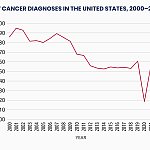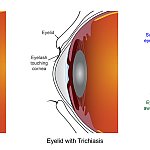
A new paper, which appears in The British Journal of Psychiatry, concludes that females with an attention-deficit and hyperactivity disorder (ADHD) diagnosis die 8.64 years earlier than females without. Similarly, males with ADHD die 6.78 years earlier on average.
The authors suspect the shortened lifespan is not because of the condition itself. Instead, it may be due to co-occurring health conditions, unmet medical needs, and modifiable risk factors, like smoking tobacco and substance misuse.
Here, we outline the study’s details and findings and provide tips from experts on how to support friends and family with ADHD.
ADHD is a common condition, marked by difficulty focusing and controlling attention, which makes it challenging to complete daily tasks. People with ADHD are also more likely to experience anxiety, stress, and depression.
For some with ADHD, it can be hard to sit still, and they may be impulsive and easy to distract.
Globally, ADHD affects an estimated 2.8% of people, although experts believe that many people with the condition are likely to be undiagnosed.
As the authors of the new study explain, compared with people without ADHD, those who have the condition are more likely to experience “inequality and adversity, including educational under-attainment, unemployment, financial problems, discrimination, contact with the criminal justice system, [and] homelessness.”
Sleep problems and alcohol and other substance misuse are also more likely in ADHD, as are a number of health conditions, including cardiovascular disease.
The latest study investigates how these factors might impact the lifespan of people with ADHD in the United Kingdom.
To investigate, the researchers had access to data from 30,039 people aged 18 or older with an ADHD diagnosis. The scientists compared each of these individuals with 10 participants without ADHD matched for age, sex, and other factors.
The scientists found that physical and mental health conditions were more common in those with ADHD. In fact, those with ADHD were more likely to be diagnosed with all 13 of the medical conditions they examined.
For instance, compared with people without ADHD, those with the condition were:
Importantly, they found that life expectancy for adults with ADHD relative to the general population was:
This equates to a total estimated life expectancy of 73.26 years for males with diagnosed ADHD compared with 80.03 years for those without ADHD.
For female participants with diagnosed ADHD, life expectancy was an estimated 75.15 years, compared with 83.79 years for females without a diagnosis.
Medical News Today spoke with Michelle Dees, MD, a board-certified psychiatrist at Luxury Psychiatry Clinic, who was not involved in this study.
She told us that the “high prevalence of anxiety and depression with ADHD creates a volatile situation for risk-taking behavior, which includes accidents, self-harm, and more.”
Furthermore, “inaccessibility to fundamental health resources also contributes significantly,” she explained.
Additionally, Barry K. Herman, MD, told MNT that people with ADHD “have higher rates of substance abuse. They are also less likely to attend to their physical health conditions, to keep doctor appointments, and to adhere to treatment recommendations for their ADHD and other conditions.”
Herman is a board-certified adult, child, and adolescent psychiatrist and the chief medical officer at ADHD Online/ Mentavi Health. He was not involved in the current study.
Speaking with MNT, Beata Lewis, MD, an adult, child, and adolescent psychiatrist at Mind Body Seven, also not involved in this study, explained the importance of the “ripple effect.” She explained:
“Challenges with work stability often lead to financial stress, which can limit access to good healthcare, time for exercise and leisure, and clean food. Similarly, difficulties maintaining relationships can lead to social isolation. All of these factors are linked to shorter lifespans.”
According to Lewis, long-term stress in ADHD plays a pivotal role in physical health, too.
“Think of it like keeping your engine revved too high for too long — the constant stress from managing ADHD symptoms can lead to inflammation and throw off stress hormones like cortisol,” she told us. “That can cause a host of other negative health consequences.”
The authors of the study write that the results highlight “unmet support needs that require urgent attention.” They explain that, in the United Kingdom, where the cohorts for the study were based, there is a lack of specialist support in place for these people.
They call for policy changes to address shortfalls in current medical care. In agreement, Dees told MNT: “The astonishing life expectancy reduction of 7–9 years shows that more cohesive systems and interventions need to be put in place for support.”
Herman explained how focusing on diagnosis may help mitigate some of this reduction in lifespan.
“Despite improvements in diagnosing ADHD in adulthood,” he told MNT, “ADHD often goes undiagnosed, and the longer the delay in diagnosing and treating adults, the more likely they are to experience all of the risk factors that accompany the disorder.”
While large-scale changes to the health system are necessary to address the reduced life expectancy with ADHD, individuals who know people with the condition can also play a part.
We asked our experts for ways to help those in our lives with ADHD.
“Family and friends can be exceptionally supportive by fostering healthy communication around the challenges posed by ADHD,” explained Dees.
“It’s critical to support patients in living a healthy life, seeking professional help, and treating their conditions through proper supervision.” Specifically, she suggested encouraging a healthy sleep schedule and better stress management.
“Families and friends should always encourage adults with ADHD to seek and remain in treatment,” agreed Herman. He also suggested people could:
“The most important role one can play,” Herman told MNT, “is to be a good listener and advocate.”
According to Lewis, “the real game-changer is understanding that supporting someone with ADHD means being a flexible, accepting friend willing to talk about the challenges that ADHD may bring.”
“The key to making a lasting difference isn’t just offering advice but creating a safe space to share struggles openly and feel truly understood,” Lewis concluded.





